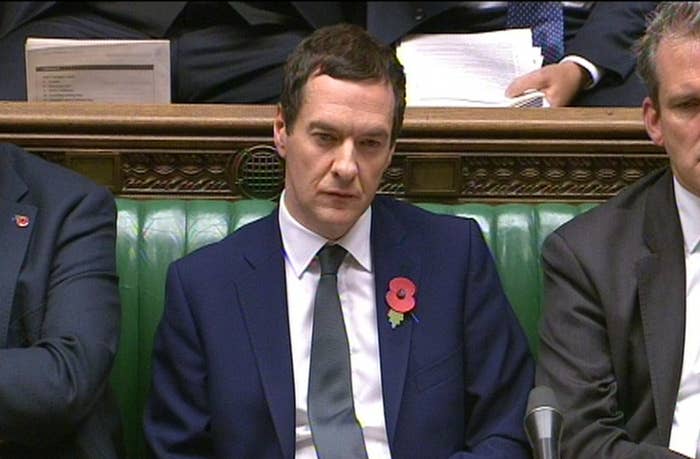
George Osborne has pledged to push ahead with cuts to tax credit payments despite last night's government defeat in the House of Lords, although the chancellor has conceded he will now have to find more ways to help those affected.
The changes to tax credits, which could cost millions of families over £1,000 a year in lost income, were due to come into effect from April 2016 with families affected informed in the run-up to Christmas.
However, Downing Street is now unable to confirm that the changes will be approved by parliament in time to meet that deadline, potentially throwing the plan to cut government spending on welfare by £4.4 billion into chaos.
"We will still pursue the goal of reforming tax credits and the chancellor will set out how at the Autumn Statement," said a Number 10 spokesperson. "Any reforms to the tax credit system will have to be in place before letters detailing changes go out."
The government also confirmed it will announced a fast-track inquiry into the relationship between the elected House of Commons and the unelected House of Lords, with the intention of making it harder for peers to block financial measures that have been passed by MPs. The Conservatives now fear they could face further defeats in the House of Lords, where they do not have a majority, on issues such as votes for 16- and 17-year-olds in the EU referendum.
Some of Osborne's political rivals seized upon the chaos as a chance to make their own case to succeed David Cameron as leader. Mayor of London Boris Johnson said tax credit changes should be altered and they "must protect [the] poorest".
tax credits must be reformed - massive subsidy for fat cat companies and poverty traps. but must protect poorest #askboris @chithecynic
At Treasury question time Osborne told MPs that the House of Lords vote against tax credit changes was an affront to democracy: "Last night unelected Labour and Liberal Democrats peers voted down the financial measures on tax credits approved by this elected House of Commons.
"That raises clear constitutional issues which we will deal with. We will continue to reform tax credits and save the money that is needed so that Britain lives within its means, while at the same time lessening the impact on families during the transition. I will set out the plans in the autumn statement.
"We remain as determined as ever to create the low-tax, low-welfare, high-wage economy that Britain needs and the British people want to see."
Osborne said the Commons had "voted three times" for the changes that were rejected by the House of Lords. Senior Tory MPs Andrew Tyrie, Edward Leigh, and Liam Fox all criticised the "unelected chamber" for overturning what they said was the will of voters.
But Labour MP Wes Streeting said: "If the chancellor had listened to the evidence from the outset he wouldn't be in this mess. Instead of manufacturing a phoney constitutional crisis, why won't he put his toys back in the pram and appreciate he needs to go back to the drawing board on his failed policy that hits working people the hardest?"
Former shadow Treasury chief secretary Chris Leslie asked to see the specific sentence in the Conservative manifesto setting out the tax credit cut. Osborne replied: "It says in that document we're going to make £12 billion of welfare savings."
The SNP's Stewart Hosie declared: "The chancellor has lost his political touch and his chance of being prime minister has just gone up in a puff of ermine-clad smoke." Dismissing his comment, Osborne replied: "All they want to talk about is party-political games."
A hush descended on the noisy chamber when shadow chancellor John McDonnell pointed out: "Can I remind the House that for 3 million people out there who have done everything asked of them, bringing up their children, going to work, this is not a constitutional matter. They will lose £1,300 a year.
"Can I reassure the chancellor that if he brings forward proposals to reverse the cuts to tax credits fairly and in full he will not be attacked by this side of the House; indeed he will be applauded."
Osborne said there was a difference between those who want to make "no savings to the welfare budget at all" and those who want to move to a "lower welfare society but want help in the transition".
The focus will now shift to how the government can soften the impact of the tax credit cuts. Torsten Bell of the Resolution Foundation think tank, which has helped lead criticism of the changes, said the government now has three options: reducing the scale of the cuts, phasing them in over a longer period, or providing extra payments to cover the transition.
"In reality they may choose a combination of all three," he wrote. "Which you think is preferable will depend on how you balance off the costs to the Exchequer with the hit to family budgets, and whether you think the problem with these changes is the timing of the losses, or the sheer scale of them. In 29 days we’ll find out which the government cares about more."

